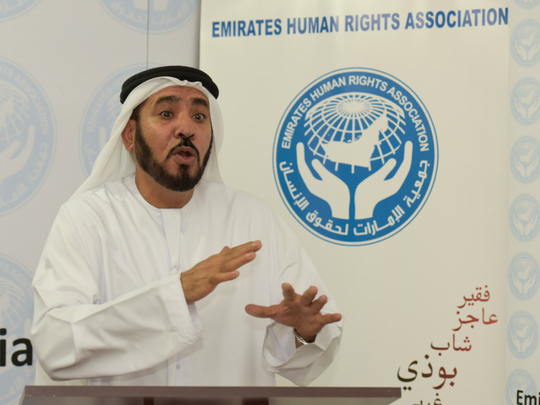
Dubai: The Emirates Association for Human Rights (EAHR) is calling on civil society organisations and parliaments in the Arab region to use the UAE’s unified model of tolerance and non-discrimination to actively combat extremism, racism, and hate speech.
The announcement was made by Mohammad Salim Bin Dwain Al Kaabi, chairman of EAHR, who said the call will extend to over 4,000 NGOs, organisations, and Arab parliaments around the world, to mark 2017 as the ‘Year of Tolerance’.
On the occasion of International Day of Tolerance (November 16), Al Kaabi said the EAHR’s call aims to encourage each country to create and adopt clear strategies to raise awareness on countering hate speech and racism, nationally and regionally. “Countries should give attention to educating young people through targeted awareness campaigns and education to protect them against recruitment by terrorist groups,” he said.
Al Kaabi added that public and private media institutions should also adopt the ‘Year of Tolerance’ as their logo in 2017 by taking responsibility for addressing the phenomenon of intolerance and hatred and adopting a permanent media strategy to confront extremism and racism.
“The UAE has taken ambitious bold steps to criminalise hate speech and defamation of religions, racism, incitement and hatred, while accepting everyone’s rights to exercise their beliefs and rituals,” he said.
With more than 200 nationalities coexisting in the UAE, Al Kaabi said the country has succeeded in creating a harmonious peaceful community, which is governed by the rule of law.
Meanwhile, the Arab region has witnessed the growth and reproduction of fundamentalist movements and extremists. Such movements are based on religious fanaticism and suppression of contrary opinions and ideologies.
“There is no doubt that the absence of a culture of tolerance in our contemporary world has led to woes and catastrophes due to the various conflicts and fighting. This has cost millions of lives while creating and reinforcing hatred and discrimination, exclusion, marginalisation, as well as poverty,” said Al Kaabi.
International Day of Tolerance, which falls on November 16 every year, was adopted by Unesco during its 28th session in Paris in 1995, with the aim of promoting human, moral and legal values.
It further calls for rejecting all forms of intolerance, fanaticism, acts of violence, terrorism, aggressive conflicts, marginalisation and discrimination against national, ethnic, religious, linguistic minorities, as well as refugees, migrant workers and vulnerable groups within communities.








